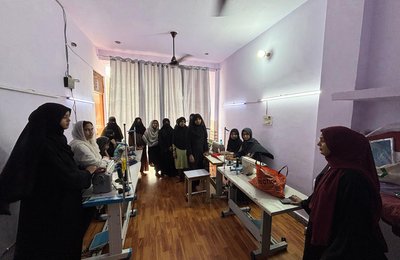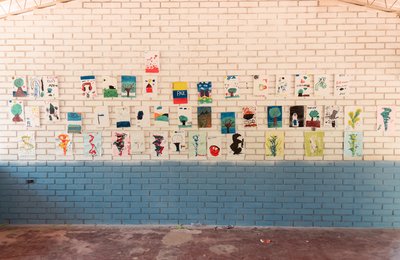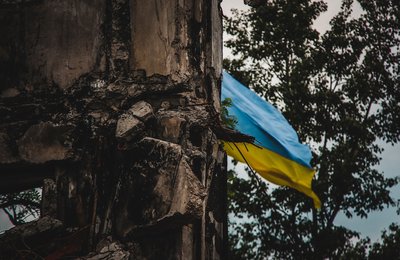Women for peace

In Ukraine, there are many civil society organisations that implement peacebuilding initiatives. But there is no data on how many CSOs are led by women or have initiatives for women. For example, the Ukrainian organization “Women for peace” is led by women. They support conflict-affected communities in the east of Ukraine through providing humanitarian aid, leading peaceful protests, and organising an annual conference – the Kyiv Global Summit called “Women. Peace. Security”. Despite some movements, a lack of funding and economic opportunities, as well as some traditional social norms, remain the main barriers to women’s participation in peacebuilding.
In my latest assignment for Peace Insight, I spoke to five women about their views on peace, the role of women in peacebuilding, the skills needed for peacebuilding, and the challenges they face. They shared the need to empower women economically, as well as to develop women’s leadership and participation in community decision-making. Ultimately, these efforts lead to reconciliation, peaceful cohesion between Internally Displaced People (IDPs) and host communities, and the resilience of conflict-affected communities.
- Kateryna Levchenko, Ukraine’s Government Commissioner for Gender Policy, told me: “The female movement in Ukraine is very strong. There are many female groups and civil society organisations. Ignoring women’s voices is a warning sign for conflict. The majority of IDPs in Ukraine are women – women with children, elderly women, young women. One of the biggest challenges for these women is an economic one. Many of them lost their homes. It took some time for them to start a new life. Women’s participation in peacebuilding gives us an opportunity to reveal “women’s issues”, like family, social policy, education, healthcare, and the environment. But these are not only “women’s issues”; they are also important for men, and the community”.
Watch the interview with Kateryna here.
- After being displaced by conflict, Olga Shulik started a new life and began supporting local women and communities. She moved from Donetsk to Dnipro after the conflict started and set up the human rights NGO “Spilna Koryst”. Olga also works as a mentor for women’s empowerment and encourages women to take up careers in politics and human rights. In 2014 she worked as a communications expert on a project for conflict-affected women. She collected success stories about IDP women who had started a new life and integrated into their new host communities. “Women are the most affected in conflicts, that’s why it is important to include them in peacebuilding and take into account their needs. That’s how we improve the life of the whole community. But women are not able to take an active part in peacebuilding, both during active conflict and in the recovery stages. The objective of civil society organizations and the Government should be to increase the role of women in peacebuilding,” Olga told me. Across all of my interviews, the sentiments were the same: women need to be actively involved in all stages of peacebuilding, reconciliation, and conflict recovery.
Watch Olga’s interview
- I also spoke with Marina Kurptseva, a prominent journalist and tv presenter. She also moved from Donetsk to Kyiv due to the conflict. She now works as a trainer on peacebuilding and conflict prevention and organises training for women, especially those affected by conflict. Marina told me: “The skills that we develop during the trainings are women’s leadership, and women’s participation in all the processes in the community, such as conflict prevention and conflict management as well as peacebuilding in any context. Many female IDPs had to change their professions. For example, starting to make hand-made goods”. Marina shared her views on how to bring peace to Ukraine: “The East and West of Ukraine are two parts that should unite in the center of Ukraine. There are two million officially registered IDPs, and a large percentage of them are women. Only those who experience the pain of war can understand the value of peace. Only those who saw their houses destroyed like I did, can understand why peace is needed”. Women like Marina bring insight and empathy that is crucial for peacebuilding.
Watch the video here.
- I also spoke with Natalia Karbowska, Strategic Development Director of the Ukrainian Women’s Fund (UWF). She told me about the many projects they run, led by women, to foster peace in Ukraine. The UWF, a civil society organisation, was established in 2020 to support women’s leadership, to provide expertise and financial grants, and to promote gender equality in all spheres. In our interview, Natalia told me about the “Security Audits” project run by UWF. This is an initiative that helps to engage women and men from different generations to analyse how safe life is in their communities. She explained it to me: “For example, are there are enough streetlights? How safe do our children feel when they walk to school? How well are the police trained?”. Another project of the Foundation is “Economical opportunities for women in Eastern Ukraine”, aimed at creating job opportunities for women and their communities to economically empower women and men from the conflict-affected areas in the east of Ukraine. The project was developed to guide communities through the successful recovery stage after the conflict ends and support re-integration with the non-government-controlled areas. “A lack of economic opportunities led to many other challenges that women are facing, including domestic violence. That’s why we train women in how to open their own business,” Natalia Karbowska told me.
See Natalia’s interview
- My last interview was with Anastasia Agalakova, who moved from the Donetsk oblast to the Dnipro oblast with her family in 2014 when the conflict started. She took part in projects for IDP women to support their integration into the host community by creating economic opportunities for them. In our conversation, she told me: “In 2015 I received a grant from the United Nations Development Programme to develop my business: A handmade products business. Recently, I participated in the “Economical opportunities for women in Eastern Ukraine” training. It helped me to develop the skills that were needed to further develop my business. The photographer explained to us how to take beautiful pictures of our products to display our goods with the help of light, shadows, and some accessories. I create hair accessories which are sold in 17 countries around the world. I have made more than 2,000 handmade products…I wish more projects would be created for IDP women and local communities to connect, integrate, share experiences and support each other.” Anastasia’s efforts show how with the right support, women can recover and prosper after conflict.
Watch the full interview now
One thing I took from my conversations was that peacebuilding donors and funders should support initiatives that ensure gender equality in conflict and post conflict recovery. Political space should be created for the greater participation of women in peacekeeping and peacebuilding. Globally, billions of dollars are invested in projects where only men are involved. Most women-led organisations operate with limited funding. According to the ex-Executive Director of UN Women, Phumzile Mlambo-Ngcuka: “Investment in supporting women’s leadership is the best investment in peacebuilding”. On this, I couldn’t agree more.







